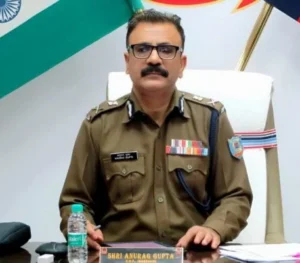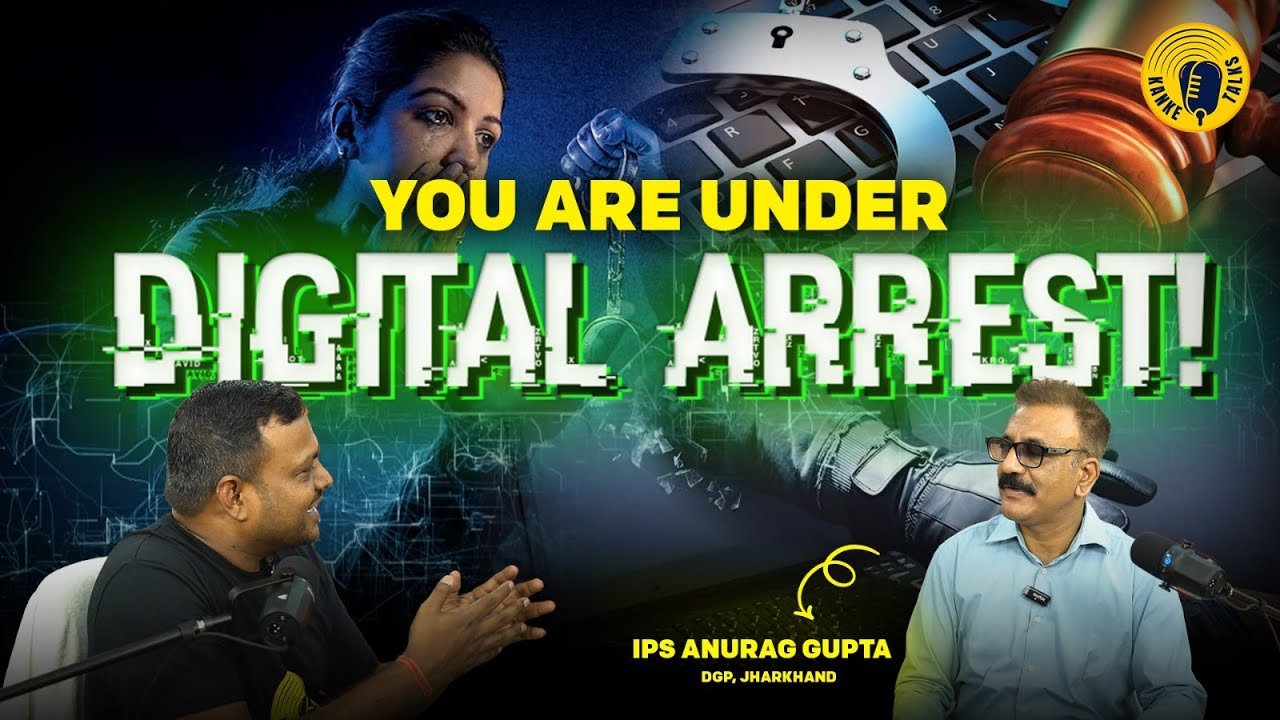In a world where our phones are smarter than some of our decisions, and scams hide behind screens, the line between reality and deception is thinner than ever. But amid this digital jungle, there are warriors like Anurag Gupta, IPS Officer and former head of Jharkhand CID, who are leading the charge against cybercrime with not just laws—but logic, leadership, and lessons for every Indian.
His voice, calm yet commanding, doesn’t just share statistics—it narrates stories. Stories of people robbed, not at gunpoint, but with fake job offers, social engineering, and “digital arrests.” Stories of resilience, awareness, and a system trying to catch up with crime.
This is not just about Jharkhand or India. It’s about you. Because in today’s era, anyone with a smartphone is either a target or a soldier in this cyber war.

The Rise of Cybercrime: Welcome to Jamtara
You’ve probably heard of Jamtara—the district that became infamous for being India’s cyber scam hub. But the real shock is: it’s just the tip of the iceberg. According to Anurag Gupta, cybercrime has two major faces:
- Small Value Crimes – These are scams under ₹2 lakhs. Think fake OTPs, phishing, online lottery calls, or messages saying, “You’ve won ₹5,000!”
- Large Value Crimes – These are elaborate frauds involving lakhs or crores, like online job scams, investment frauds, sextortion, and the scariest one—“Digital Arrests.”
What is Digital Arrest? A Nightmare in Disguise
Anurag recounts a chilling case: a Ranchi-based professor lost ₹1.78 crore. The fraudsters told him a parcel in his name was found with narcotics. The next moment, they
declared he was “digitally arrested.” Scared out of his wits, the professor transferred his life savings, sold land, mortgaged jewellery—just to avoid a fictional crime.
This is not fiction. It’s happening across India. How? Through social engineering.
Fraudsters gather information from your social media—your dog’s name, your children’s school, your friends, your PAN. Then they pose as police or officials and manipulate victims with terrifying accuracy
The “Pig Butchering” Scam Model
Anurag calls it “Pig Butchering”—a term even used globally. Just like a pig is fattened before slaughter, these criminals emotionally manipulate, trap, and financially bleed a person until nothing is left
The 1930 Helpline: A Lifeline in Your Pocket
To fight back, the government has introduced the 1930 Cyber Helpline. It’s not just a complaint number—it’s a rapid response unit.
If you’re scammed, call immediately. The CID cyber center works 24/7 to freeze bank accounts before the money vanishes.
In the last 6 months alone, Jharkhand police recovered ₹15 crore, with Anurag proudly stating that speed, awareness, and strong coordination with judiciary made it possible.
Digital Footprints: Every Move Leaves a Mark
Every time you use your phone, you leave a trace—a digital fingerprint. Anurag’s team uses this to track ATM robbers, drug traffickers, and even sextortion gangs. He shares how a gang using gas cutters to rob ATMs was tracked through Fast Tag movement and fingerprints.
“There’s no such thing as anonymous on the internet,” he declares. “You leave a clue. We’ll find you.”
Sextortion and Fear: The Silent Scourge
Sextortion—a rising crime—uses shame and fear as weapons. A girl or boy is tricked into video calls, recorded without consent, and blackmailed.
Anurag’s advice? Don’t panic. Don’t pay. Report.
Why? Because paying once doesn’t end it. It fuels it. “They’ll take your last rupee,” he says, “until you say—‘Do what you want, I’m reporting you.’ That’s when it ends.”

Fighting Cybercrime: Zero Tolerance
Cybercrime has become organized crime, not just in Jamtara but also in Southeast Asia. With fake SIMs, mule accounts, and a network of enablers, it’s a global issue.
But so is the response. Through initiatives like:
- Reflection Maps to track cyber hotspots.
- Mule Account Crackdowns in collaboration with the Union Home Ministry.
- State-by-state raids, using air travel for faster criminal arrests.
Anurag proudly states, “Jharkhand is leading. We’ve arrested over 1,200 cyber criminals in just six months.”
Youth, Drugs, and Responsibility
Beyond cybercrime, Anurag is deeply worried about drug abuse—especially among students. He classifies it in three ways:
- Opium grown locally in Chatra and Latehar.
- Cannabis trafficked from Odisha and Andhra.
- Brown Sugar brought in and sold around schools.
What’s scary? Peer pressure. Kids push kids into addiction. And parents, often unaware, don’t know how to intervene.
That’s why Anurag’s CID works with NGOs, schools, and JHALSA (Jharkhand Legal Services Authority) to spread awareness and reduce demand.
Khelo India, Not Kill Time
“Why are today’s children only playing games on screens?” Anurag laments. His advice?
- Encourage sports like football—cheap, intense, team-building.
- Get kids dirty in mud, not addicted to mobiles.
- Don’t raise children with just marbles and tiles—let them fall, get up, and play.
Modern Policing Needs Modern Sensitivity
One of Anurag’s strongest beliefs? Women make policing better.
Why? Because women bring sensitivity, empathy, and courage. He wants more women in police stations, especially at public-facing roles like Munshi desks.
“We must change the narrative that police only shout or threaten,” he says. “We’re here to serve.”
Crime and Rehabilitation: Two Sides of the Law
Some critics say police must also rehabilitate criminals. Anurag’s response is clear:
“My job is to catch. Rehabilitation is someone else’s responsibility. If you commit a crime, you’ll go to jail. Ten crimes? Ten jails. Period.”
It’s a hard stance, but it’s built on results.
Jharkhand at 24: From Naxalism to National Model
Reflecting on 24 years of Jharkhand, Anurag shares pride and pain.
✅ Pride: From being a Naxal-infested region, 90% of the affected districts are now peaceful. Jharkhand Police sacrificed over 500 officers to achieve this.
❌ Pain: The relationship between police and people still needs work. “Policing must be about public service. Not power. That’s the culture we’re trying to build.”

No responses yet